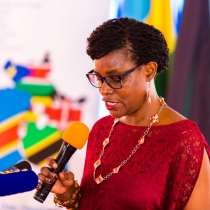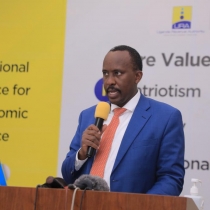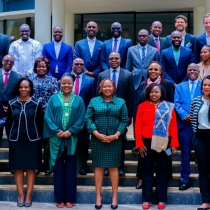
Comment: Are the Doomsday Stories on Climate Change Real or Exaggerated?
By Dennis Katungi
We need to begin to think smartly about climate change. We need to talk about global climate economics. There are costly damages associated with climate change just as there are costly implications associated with climate policies world-wide. Politicians and the Media tend to dwell on the former. Since global citizens bear the cost of the policies as well as that of climate change, actors ought to mind both.
In a country like Uganda, struggling to raise the standard of living of its people above the threshold via ‘transformative action plans’, it would be foolhardy to approach climate change issues in the same way as OECD [Organisation for Economic Co-operation and Development] countries –i.e. all the rich countries in the world.
For instance, in Uganda, indeed in Africa, we are dealing with energy poverty. The use of wood for fuel is a big issue for us. We lose 120,000 hectares of forest every year. So, when someone from the global north tells you about energy transition, you must ask: ‘Transition from what to what? Ugandans could well argue that their oil resources will save the forests through improved standard of living for our people to afford Gas for cooking.
In a recent survey of OECD countries, about 60% of respondents said they believe that global warming will lead to the end of mankind. This is due to the fact that much of the conversation around global warming is vastly exaggerated in the global north.
Let me elucidate my points as an informed Communications Specialist, not a scientist. I focus on the economics of the issue at hand. After all, there is a raging dispute over the science of global warming and the extent to which the ‘warming’ is man-made. I don’t intend to weigh in on the controversy, except to concede that global warming is real, to some extent man-made, and a serious problem.
The degree of seriousness is obviously important to address. If the world will end in twelve years ‘if we don’t address climate change’- as U.S. Congress woman Alexandria Cortez claimed in 2019, it would be justified demanding that the world should do whatever it takes to prevent the Armageddon. Is climate change the equivalent of a giant meteor hurtling towards Earth? Political rhetoric of that sort does not add up. It can be demonstrated that climate change, however serious, is not an incoming giant meteor about to strike planet earth.
UN Secretary General Antonio Guterres and other Western leaders including the current administration in the U.S. tend toward the end of the world point of view: “The world is facing a grave climate emergency. Every week brings new climate-related devastation stories. Floods. Drought. Heat waves. Wildfires. “Climate change is the biggest threat to the global economy”. These claims are echoed endlessly in the Media. Meanwhile, the rhetoric has not stopped the drilling at the Willow Oil project in Alaska, where five drill pads for a total of 250 oil wells is under construction.
On 2nd August 2023, The Times of London reported a clash between British PM Rishi Sunak and UN Secretary General Antonio Guterres. The latter criticised the hundreds of new oil and gas licences to UK companies to drill their Oil & Gas in the North Sea. In return, PM Rishi Sunak assured SG Gutteres that Britain would reduce its reliance on fossil fuels only [over a period of time]. “We should use the resources that we have here at home first and foremost, and let me inform the SG and everyone else, UK has the largest offshore wind farm in the world, we should not take any lectures from anybody about our record, which is better than everyone else’s”.
Similarly, in Uganda we’ve been saying that we embrace the global thrust for clean energy but studies have shown that we can do both. We can exploit our Oil & Gas responsibly. For instance, Uganda agreed with TotalEnergies to develop 1 gigawatt of renewable energy by 2030. We have taken cognizanse of the climate developments both at national & global levels to achieve minimal carbon intensity. The climate change aspects of Tilenga, Kingfisher and EACOP were thoroughly assessed within the Environment, Social & Impact Assessment and approved by the Country’s respected Environmental Authority. Uganda’s stand is not different from the UK’s.
Consider what we know about the scare stories; the supposed rise in ‘super storms’ such as strong hurricanes. The US has seen less and less since 1900 and they have been declining, not increasing –data on record indicate. We see the same thing if we look at total disruptive weather patterns in satellite era, 1980-2022. In fact, 2022 was the second lowest recorded year. That was never reported anywhere because it does not fit the dooms day climate change narrative.
What about the supposed increase in wildfires due to climate change? Satellite imagery indicates that although there were fires in parts of Australia –news crews huddled around Sydney and Melbourne – the epicentre of the fires – the rest of the country was not burning. The recent fires were among the lowest on record for Australia as a whole.
It’s not what you see on Television or read in newspapers. Perhaps the implementation of a strong climate policy might reduce instances of fires, but even if Australians do nothing, the number of fires will almost certainly continue to decline contrary to what you hear from activists or read in The New York Times.
Humans have a wonderful ability to adapt to circumstances, and we should include that fact in the climate conversation. We should ask questions like: How many people die overall as a result of the troubled climate, i.e., floods, droughts, storms, wildfires, and extreme temperatures? Preventable diseases like malaria and TB kill a lot more humans globally than the climate issues put together!
The lesson to be drawn from this is that if a country like Uganda wants to reduce the number of its citizens dying as a result of climate change, it should pursue economic and technological development which can be propelled by the natural resources available to it including the Oil. Once we affirm that human beings are quite smart in terms of their ability to adapt, we can begin to see why so many of the current global climate policies are so ill-conceived; again, driven by the most polluting global north.
If the UK leader makes a strong case to continue exploiting fossil fuel in the north sea, why would Uganda not make a firm stand on its own extractive activity in the Albertine graben?
Recently, a Research and Specialist study group, the Copenhagen Consensus Centre assembled over 50 of the world’s top climate economists, including three Nobel laureates, with the goal of trying to figure out how to get the best return on each dollar spent on the climate – the world over. Needless to say, they discovered that some of the typical solutions rich countries have embraced have a very poor impact. One of them was the European Union’s 2020 policy, which included a goal to reduce Carbon dioxide (CO2) by 20 percent and increase the use of renewable energy to 20 percent of total energy consumption by 2020. That policy had a huge cost while failing to cut CO2. The net economic result, the study found, was that every dollar the EU spent on climate led to a reduction of three cents in world-wide climate damage. Had the EU given away just a dollar, it could have done 97 cents more good. There lies the Achilles heel of dollar-rich global climate change policies that hardly touch Africa.
The Writer is a Communications Specialist with the Ministry of ICT & National Guidance.
@Dennis_Katungi
Links
- 143 views












































Join the conversation